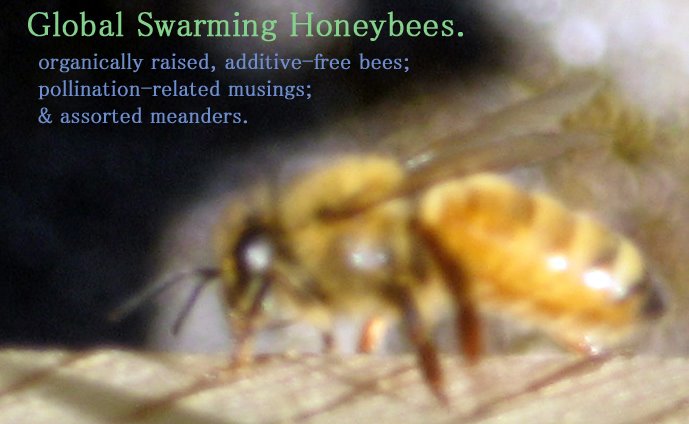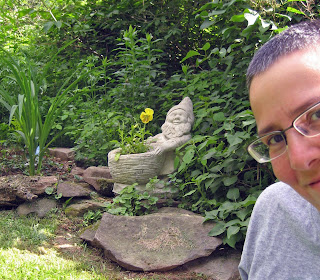I've been remiss about keeping up with this blog—too much actual living, being, and doing—but every now and then something crosses the transom and I feel compelled to share.
Here's a pretty cool blog about beekeeping in Turkey—take an amble over there and let me know what you think.
9.26.2011
(Feminist) Beekeeping in Turkey
5.24.2011
Urban Beekeeping, Hong Kong
Here's an absolutely lovely video about a beekeeper-artist-visionary in Hong Kong named Michael Leung. I love what he says about moving slowly, calmly, in a Zenlike way when working with the bees, and I love his steadfast attitude toward the work he's doing to promote all sorts of important connections that, for many, have been lost but now are found.
Nokia - HK Honey from The Silentlights on Vimeo.
4.12.2011
Caffeinated Bees
Interesting goings-on at the compost heap the other day, with the honeybees frenetically gathering coffee grounds in their pollen baskets. Not sure what was up with that, but the proof is posted below for all to see.
Given the dearth of pollen sources so early in the season up in the Northern Catskills, perhaps the bees were simply "taking what they could get" by gleaning the coffee from our discarded Melitta filters. I wonder what, if any, merit the grounds have from a nutritional perspective.
Or perhaps these bees (and, one can only hope, bees across the world) are hyping themselves up for a long overdue battle with homo sapiens for world dominance. If so, I'm rooting for the bees and will gladly serve as barista to the revolution.
What interesting or unexpected things have you observed honeybees gathering or doing of late?
3.28.2011
Wildflowers as Mirrors
The New York Times has just published a quite wonderful, and mournful, meditation on the lost flora of New York City by the Executive Director of N.Y.C. Wildflower Week.
I highly recommend taking a look, whether or not you live in NYC, as a motivating meditation on the importance of finding ways, large and small, to help replenish and restore this battered world.
3.14.2011
Thinking of Japan
***
I am asking my friends to consider making a donation
to the Japan Earthquake Relief Fund.
I am confident this support will go to the right places in a timely way.
3.02.2011
Apropos of Nothing
This doesn't even remotely qualify as beekeeping-related, but I just had to share it. I found it on a great website called Braining Pickings that a friend turned me on to recently.
Drawing Inspiration from Wesley Louis on Vimeo.
2.17.2011
Pollinators on Parade
National Geographic, which can still be counted on for phenomenal visuals, has posted a breathtaking photo slide-show by Mark Moffett of pollinators great and small.
Take a look-see. You won't be disappointed.
2.02.2011
"Secrets Honey for Yemen"
Wren's folks recently returned from a trip to the Middle East. They're always very generous about seeking out honey to bring home to us, and once again they came through on this trip.Check out the swank set-up this gentleman from Amman has created for marketing his honey. I love those hexagonal display shelves. We've been enjoying the jar of honey pictured below with our morning yogurt—absolutely divine!
(Thanks to Fred Sanders for allowing me to share his photos here.)
1.31.2011
1.25.2011
Earthworms Deserve More Poems!
A friend recently asked me for a copy of this poem I wrote back in 1999, while at a writer's colony in Taos, New Mexico.
I'm glad she did, for I'd forgotten about it and was glad to be reunited with the strong pleasure I feel when I remember to take the time to commune with the worms. Earthworms are one of the many unsung heroes of the natural world. For gardeners, they're good friends, but all of us who eat are directly enriched by the work they do.
And so I hope you'll enjoy my poem, "Reward."
REWARD
You must first be willing to kneel before the meadow.
Align your ear to its uneven surface and you will hear
the wheezing earthworms below, rubbery locksmiths
tunneling through their monotonous dimension. You
will hear the mild sucking of the earth entering into them,
the rasping friction of soil undulating uneasily through
them, and its loose translation into unstrung
baby bracelets of aerated loam. Look around you,
for you are kneeling amidst a sea of worm-castings,
amidst their labor and its souvenirs.
Then smell the worked-over soil their bodies revise.
And in that scent, find the echo of the sound,
its manifestation: the world passed through
the earthworm’s body
a key in its keyhole,
music through its bell.
1.24.2011
Honeybee Exploring Metaphoric Flower
One day last summer, an adventurous (or witty?) honeybee thoroughly investigated the plastic flower design on my watering can.
1.22.2011
Honeybee Visiting Chive Blossom
In this time of winter, memories of summer are an oasis. Think back to the honeybee stuffing her pollen basket with the chive's cheerful orange pollen.
1.20.2011
Self-Portrait With Bees (A Poem)
SELF-PORTRAIT WITH BEES
Entering the hive
is like falling down a black velvet staircase.
Off come the gloves, the hat, the veil.
Proudly, I pose for my portrait with sweetness,
my portrait with pain.
1.19.2011
My Compost, Myself.
Awhile back, I wrote this mini-essay for a literary calendar project a friend of mine was putting together.
Today, in the snowy Catskills, I happened upon it and thought it might be fun to reprise it here. At this phase of the year, the tactile pleasure of handling earthworm-y compost is a fond memory, buried under a foot or so of snow; these days, a trip to empty the compost is a vaguely life-threatening battle with deep snow and icy patches.
I miss the sight, smells, and yes, sounds of robust mid-summer soil. In that spirit, herewith, alongside my freshly unearthed meditation on compost and poetry, are some "action shots" of my beloved compost pile taken over the past couple of years.In my compost pile at this very moment are: eggshells, a rotted zucchini, strawberry hulls, hot pink earthworms, fish bones, onion skins, hardworking ants, an old copy of The Joy of Cooking, aged cow manure (hauled in buckets from a farm pile 10 miles away where I force my girlfriend to take me every summer), deadheaded daffodils, weeds whose names I won’t bore you with, teabags, and the shredded drafts of old poems.
I love the idea of my words returning to the earth, since the inspiration for much of my writing and more and more of my living is the world of nature.Compost Happens, says a popular bumper sticker, but I think of compost the way I think of poetry: a process of thoughtful addition, disciplined editing, experimentation, and alchemy. Just the right amount of attention is required: too little, and you get a cold pile of nothing; too much, and you overwork the magic. Words squirm together on the page and life is born, but if the artistic choices aren’t right, you wind up with a stinking anaerobic sludge.
Like compost, writing should startle and surprise. My compost pile has revealed spotted salamanders, red-bellied snakes, handsome toad-elders, iridescent beetles, moles, voles, stupendously handsome red-bellied snakes, and luminescent worms so thin they’re barely there at all—each and every one of these animalitos de dios evoking a sense of gratitude and awe akin to the very best (and rarest) moments of creative pursuit. Like writing, compost is deep.
Bonus compost-sagas:
1.11.2011
Bee Watching
How about a gorgeous slide show of New York City bees to get your wintry mind rolling in a summerly direction?





